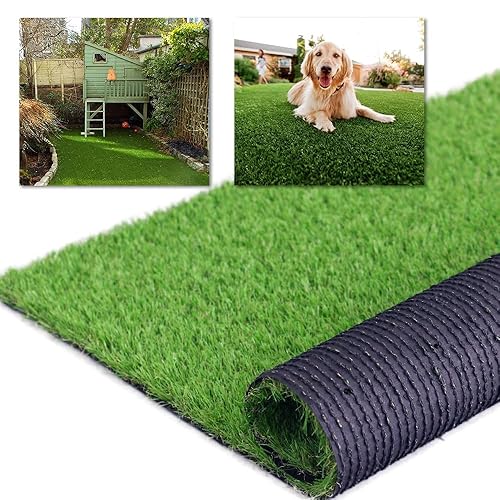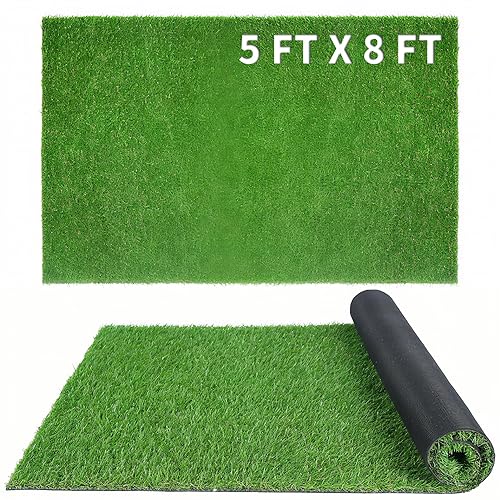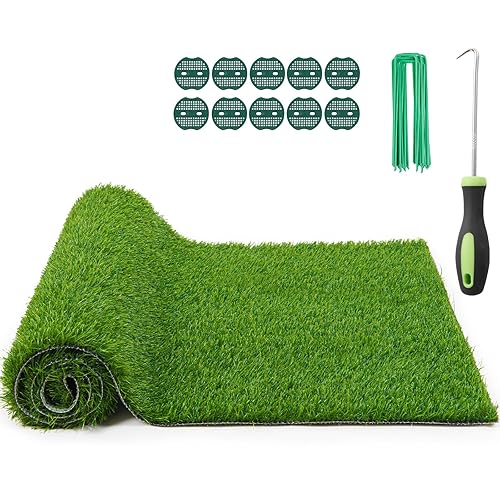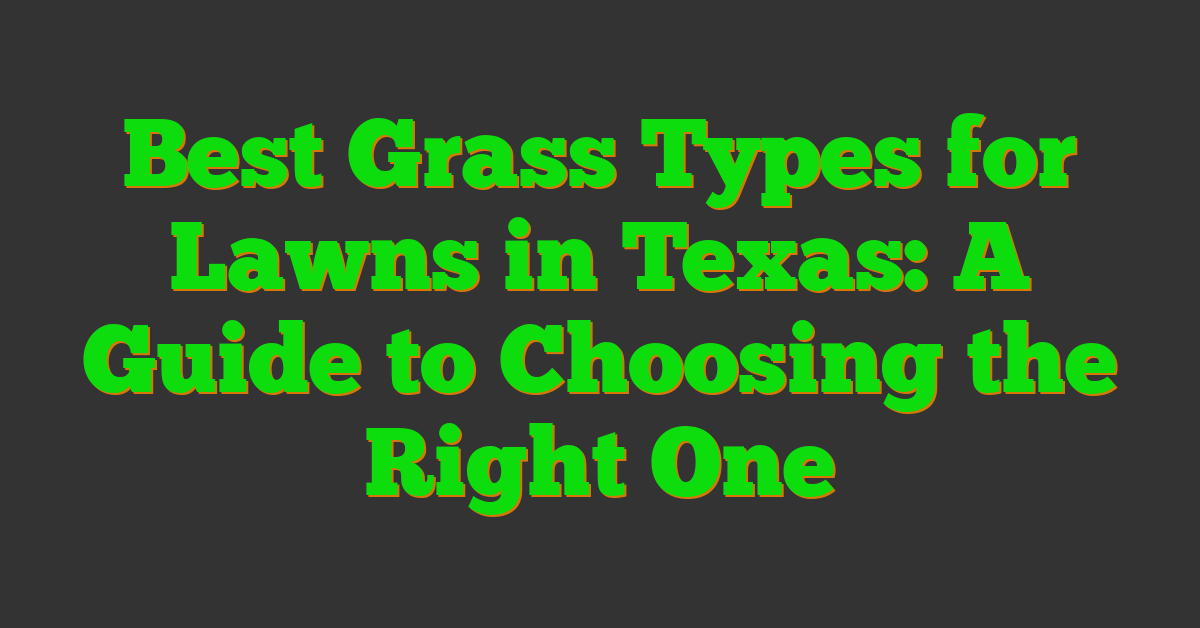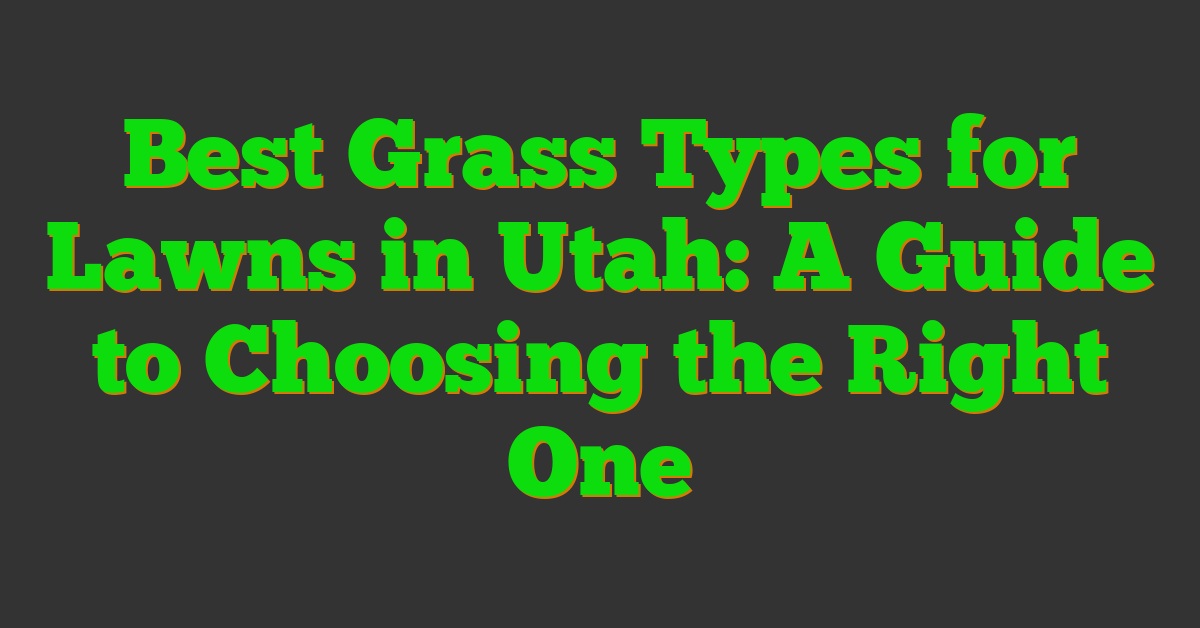If you’re a homeowner in Tennessee, you know that having a lush, green lawn is a source of pride. But with so many grass varieties to choose from, it can be challenging to determine which type is best for your lawn. Fortunately, we’ve done the research for you and compiled a list of the best grass types for lawns in Tennessee.

Before you choose a grass type, it’s essential to understand the climate in Tennessee. The state has a humid subtropical climate, which means hot summers and mild winters. This climate is ideal for growing warm-season grasses, such as Bermuda grass, Zoysia grass, and Centipede grass. However, some areas of the state experience cooler temperatures, making cool-season grasses like Kentucky Bluegrass and Tall Fescue a better choice. Understanding the climate is crucial in choosing the right grass type for your lawn.
Now that you have a basic understanding of the Tennessee climate, let’s dive into the best grass types for Tennessee lawns. We’ll explore the characteristics and needs of each grass type, so you can make an informed decision about which one is right for your lawn. Whether you’re looking for a low-maintenance grass or one that can withstand heavy foot traffic, we’ve got you covered.
Key Takeaways
- Understanding the Tennessee climate is crucial in choosing the right grass type for your lawn.
- The best grass types for Tennessee lawns depend on the region you live in and the characteristics and needs of each grass type.
- Whether you’re looking for a low-maintenance grass or one that can withstand heavy foot traffic, there is a grass type that will suit your needs.
Understanding the Tennessee Climate

https://www.youtube.com/watch?v=kjI3vMTsTWg&embed=true
If you’re planning to grow a healthy and beautiful lawn in Tennessee, it’s essential to understand the state’s climate. Tennessee has a transitional climate zone, which means it experiences both hot summers and cold winters, making it challenging to maintain a healthy lawn year-round.
In the summer, temperatures can reach up to 90°F, and the humidity can make it feel even hotter. On the other hand, winters in Tennessee can be cold, with temperatures dipping below freezing. The northern part of the state experiences more prolonged and harsher winters than the rest of the state.
The Cumberland Plateau and Eastern Tennessee are mountainous regions that have cooler temperatures than the rest of the state. These areas also receive more rainfall than other parts of Tennessee, which can affect the type of grass that grows best in these regions.
In the transitional zone, which includes most of Tennessee, the weather is unpredictable. This zone experiences a mix of northern and southern climates, which can make it challenging to choose the right grass type for your lawn.
When it comes to snow, Tennessee receives an average of 10 inches per year, with the northern part of the state receiving more snowfall than the rest of the state.
Overall, Tennessee’s climate can be challenging for maintaining a healthy lawn. However, by choosing the right grass type and following proper lawn care practices, you can grow a beautiful lawn that can withstand the state’s unpredictable weather.
Grass Types for Tennessee Lawns
https://www.youtube.com/watch?v=EneMbBWn57U&embed=true
If you’re looking to grow a lush, green lawn in Tennessee, it’s important to choose the right type of grass. The best grass for your lawn will depend on a variety of factors, including your region, the amount of sunlight your lawn receives, and your personal preferences. Here are some of the most popular grass types for lawns in Tennessee:
Fescue
Fescue is a cool-season grass that does well in Tennessee’s climate. It comes in several varieties, including tall fescue, fine fescue, and creeping red fescue. Tall fescue is the most common type of fescue used for lawns in Tennessee. It’s a durable grass that can handle heavy foot traffic and is resistant to disease.
Bluegrass
Kentucky bluegrass is a popular choice for lawns in Tennessee. It’s a cool-season grass that does well in the state’s cooler temperatures. Bluegrass is known for its fine texture and deep green color. It’s a good choice for lawns that receive a lot of sunlight.
Zoysia
Zoysia grass is a warm-season grass that does well in Tennessee’s hot and humid summers. It’s a low-maintenance grass that requires less water and fertilizer than other types of grass. Zoysia is known for its thick, lush growth and is a popular choice for golf courses and athletic fields.
Bermuda
Bermuda grass is another warm-season grass that does well in Tennessee’s climate. It’s a durable grass that can handle heavy foot traffic and is resistant to drought. Bermuda grass is known for its fine texture and is a popular choice for golf courses and athletic fields.
Ryegrass
Ryegrass is a cool-season grass that is often used as a winter overseed in Tennessee. It’s a fast-growing grass that can provide a temporary green cover during the winter months. Ryegrass is often used to overseed warm-season grasses like Bermuda and Zoysia.
Centipede Grass
Centipede grass is a warm-season grass that does well in Tennessee’s hot and humid summers. It’s a low-maintenance grass that requires less water and fertilizer than other types of grass. Centipede grass is known for its light green color and is a good choice for lawns that receive a lot of shade.
Turf-Type Tall Fescue
Turf-type tall fescue is a type of tall fescue that is often used for lawns in Tennessee. It’s a durable grass that can handle heavy foot traffic and is resistant to disease. Turf-type tall fescue is known for its deep green color and fine texture.
Fine Fescues
Fine fescues are a group of cool-season grasses that do well in Tennessee’s cooler temperatures. They come in several varieties, including creeping red fescue, chewings fescue, and hard fescue. Fine fescues are known for their fine texture and are often used in shady areas.
When choosing the best grass for your Tennessee lawn, it’s important to consider factors such as your region, the amount of sunlight your lawn receives, and your personal preferences. By choosing the right type of grass, you can create a beautiful and healthy lawn that will thrive for years to come.
Warm-Season vs Cool-Season Grasses
https://www.youtube.com/watch?v=T0Sa7b1YJvQ&embed=true
When it comes to selecting the right grass type for your lawn in Tennessee, it’s important to understand the difference between warm-season and cool-season grasses.
Best Grass Types for Lawns in Texas: A Guide to Choosing the Right One »
Cool-Season Grasses: These grasses grow best in cooler temperatures and are commonly found in the northern parts of the United States. Some popular cool-season grasses include Kentucky bluegrass, tall fescue, and perennial ryegrass. These grasses thrive in temperatures between 60-75°F and will start to go dormant when temperatures rise above 85°F.
Warm-Season Grasses: These grasses grow best in warmer temperatures and are commonly found in the southern parts of the United States. Some popular warm-season grasses include Bermuda grass, zoysia grass, and centipede grass. These grasses thrive in temperatures between 80-95°F and will start to go dormant when temperatures drop below 60°F.
When choosing between warm-season and cool-season grasses, it’s important to consider the climate in your area. In Tennessee, the climate is generally warm and humid, which makes warm-season grasses a great choice for most homeowners. These grasses are drought-tolerant and can handle the hot summers in Tennessee.
On the other hand, if you live in the higher elevations of Tennessee where temperatures can drop below freezing, cool-season grasses may be a better choice. These grasses can handle the colder temperatures and will stay green throughout the winter months.
In summary, warm-season grasses are a great choice for most homeowners in Tennessee due to their ability to handle hot and humid summers. However, if you live in higher elevations where temperatures can drop below freezing, cool-season grasses may be a better choice.
Grass Characteristics and Needs
https://www.youtube.com/watch?v=ZtPVyDml6HM&embed=true
When choosing the best grass type for your lawn in Tennessee, there are several characteristics and needs you should consider. Here are some of the most important factors to keep in mind:
Traffic and Foot Traffic Tolerance
If your lawn will have a lot of foot traffic, such as from children playing or pets running around, you’ll want to choose a grass type that can handle it. Bermuda grass, centipede grass, and zoysia grass are all good options for high-traffic areas.
Shade Tolerance
If your lawn doesn’t get a lot of direct sunlight, you’ll want to choose a grass type that is shade-tolerant. Fine fescue and creeping red fescue are both good options for partial shade, while St. Augustine grass and zoysia grass can handle more shade.
Disease Resistance
Some grass types are more susceptible to diseases like brown patch than others. If you want to minimize the risk of your lawn being affected by disease, consider planting a type of grass that is known for its disease resistance. Tall fescue is a good option for this.
Drought Tolerance
Tennessee can experience hot, dry summers, so it’s important to choose a grass type that can handle drought conditions. Bermuda grass, zoysia grass, and centipede grass are all known for their drought tolerance.
Maintenance Needs
Different grass types have different maintenance needs. Some require more water and fertilizer than others, while some need to be mowed more frequently. If you’re looking for a low-maintenance option, consider planting a type of grass like tall fescue or Bermuda grass.
Appearance
Of course, you want your lawn to look good! Some grass types have a finer texture and are more dense, while others have coarser leaves. Kentucky bluegrass is known for its attractive appearance, while Bermuda grass is a good option if you want a lawn that looks manicured.
Weed Resistance
No one wants a lawn full of weeds. Some grass types are more resistant to weeds than others. Tall fescue and zoysia grass are both known for their weed resistance.
In summary, when choosing the best grass type for your lawn in Tennessee, consider factors like traffic tolerance, shade tolerance, disease resistance, drought tolerance, maintenance needs, appearance, and weed resistance. By taking these factors into account, you can choose a grass type that will thrive in your yard and provide you with a beautiful lawn for years to come.
Lawn Care Practices in Tennessee
https://www.youtube.com/watch?v=yEyfdXdfH7A&embed=true
Maintaining a healthy lawn in Tennessee requires proper lawn care practices. Here are some tips to help you keep your lawn looking lush and green.
Mowing
Mowing is an essential part of lawn care. It helps to promote healthy growth and prevent weed growth. In Tennessee, it is recommended to mow your lawn at a height of 2-3 inches. However, during the hot summer months, you may want to increase the mowing height to 3-4 inches to help your lawn retain moisture.
Watering
Watering is crucial to the health of your lawn. In Tennessee, it is recommended to water your lawn deeply once a week. This will encourage deep root growth and help your lawn withstand drought conditions. However, during periods of heavy rainfall, you may not need to water your lawn at all.
Maintenance
Regular maintenance is key to keeping your lawn healthy. This includes fertilizing, overseeding, and repairing any damaged areas. Fertilizing should be done in the spring and fall, while overseeding should be done in the fall. Repairing any damaged areas should be done as soon as possible to prevent further damage.
Lawn Pests
Common lawn pests in Tennessee include armyworms, chinch bugs, and grubs. These pests can cause significant damage to your lawn if left untreated. It is recommended to use an insecticide to control these pests.
Lawn Diseases
Tennessee’s warm and humid climate creates the perfect conditions for lawn diseases. Some common lawn diseases in Tennessee include brown patch, dollar spot, and rust. To prevent these diseases, it is important to maintain proper lawn care practices, such as mowing at the correct height and watering deeply.
Weed Control
Weeds can quickly take over a lawn if left unchecked. In Tennessee, it is recommended to use a pre-emergent herbicide to prevent weed growth. However, if weeds do appear, it is important to remove them as soon as possible to prevent them from spreading.
By following these lawn care practices, you can keep your lawn healthy and looking its best.
Choosing the Right Grass Seed
https://www.youtube.com/watch?v=xNDXFE_ESoc&embed=true
When it comes to choosing the right grass seed for your lawn in Tennessee, there are a few things to consider. First, you need to determine whether you want to go with cool-season or warm-season grasses. Cool-season grasses are better suited to cooler weather and can withstand harsher winters, while warm-season grasses thrive in hot summers but milder winters.
Next, you need to take into account the soil type and pH level of your lawn. For Tennessee, the ideal soil pH level is between 6.0-7.5, and the grass seed options that perform best are those that grow well in well-drained, heavy soils with high fertility.
There are several grass seed options available for Tennessee lawns, including:
- Jonathan Green (11970) Blue Panther Kentucky Bluegrass Grass Seed (3 lbs.)
- SeedRanch Midnight Kentucky Bluegrass Seed (5 lbs.)
- Jacklin Seed – Biltmore Blue Blend – 100% Kentucky Bluegrass (5 lbs.)
- Combat Southern 3-way mixture of turf type fescue and Hybrid Bluegrass
Fescue and bluegrass mixed together is the ideal combination for a beautiful yard in the Volunteer State. It is important to note that different grass seed mixes have different requirements for soil, sunlight, and water, so be sure to read the labels carefully before making a purchase.
When it comes to seeding your lawn, it is recommended to use a seed spreader to ensure even distribution. You should also prepare the soil by removing any weeds or debris and loosening the soil to a depth of at least six inches before seeding.
Overall, choosing the right grass seed for your lawn in Tennessee requires careful consideration of several factors, including soil type, pH level, and grass seed options. By taking the time to research and select the right grass seed for your needs, you can ensure a lush and healthy lawn for years to come.
Using Sod for Instant Lawns
https://www.youtube.com/watch?v=0Ml9XctCQZs&embed=true
If you want an instant lush lawn, sod is the way to go. Sod is pre-grown grass that is cut into squares or rolls and laid on top of the soil. It is a quick and easy way to get a beautiful lawn without having to wait for grass seed to grow.
Sod is especially useful if you have a special event coming up, like a wedding or graduation party, and you want your lawn to look its best. It is also a great option if you have just moved into a new home and want to have a beautiful lawn right away.
One of the advantages of using sod is that it is weed-free. Sod is grown in a controlled environment, so it doesn’t have any weeds or other unwanted plants growing in it. This means that you won’t have to spend time and money trying to get rid of weeds after you lay the sod.
Another advantage of using sod is that it is easy to install. You can lay sod yourself or hire a professional to do it for you. If you decide to do it yourself, make sure that you prepare the soil properly before laying the sod. You will need to remove any rocks, debris, and old grass from the area where you will be laying the sod. You may also need to add some topsoil or compost to the area to ensure that the sod has a good growing environment.
Once you have laid the sod, make sure that you water it regularly. Sod needs to be watered frequently during the first few weeks after it is laid. This will help it establish roots and grow properly. After the sod has been established, you can reduce the amount of water that you give it.
Overall, using sod is a great way to get an instant lush lawn. It is easy to install, weed-free, and can be used for special events or to improve the look of your home.
Grass for Special Purposes
https://www.youtube.com/watch?v=AS5P4KcgSTg&embed=true
In addition to choosing the right grass for your Tennessee lawn, you may also need to consider the specific purpose of your grass. Here are some common special purposes for grass and the types of grass that work best:
Golf Courses
If you’re looking to create a golf course in Tennessee, you’ll want to choose a grass that can withstand heavy foot traffic and frequent mowing. Bermuda grass and Zoysia grass are both good options for golf courses, as they are durable and can handle a lot of wear and tear.
Parks and Recreation Areas
For parks and other recreational areas, you’ll want a grass that can handle heavy foot traffic and provide a soft surface for activities like picnics and sports. Bermuda grass and Zoysia grass are both good options for this, as they are durable and can handle a lot of wear and tear.
Football Fields
If you’re looking to create a football field in Tennessee, you’ll want to choose a grass that can handle heavy foot traffic and provide a safe surface for players. Bermuda grass and Zoysia grass are both good options for football fields, as they are durable and can handle a lot of wear and tear.
Backyards
For backyard lawns, you’ll want a grass that is easy to maintain and looks good. Tall Fescue is a good option for Tennessee backyards, as it is low-maintenance and can handle a variety of weather conditions.
National Parks
If you’re looking to create a grassy area in a national park, you’ll want to choose a grass that is native to the area and can handle the local climate. Kentucky Bluegrass and Tall Fescue are both good options for national parks in Tennessee.
No matter what your specific needs are, there is a grass type that will work for you in Tennessee. Consider your specific needs and choose a grass that can handle the demands of your specific situation.
Dealing with Pests and Diseases
https://www.youtube.com/watch?v=qLbzKWeATHI&embed=true
Maintaining a healthy lawn in Tennessee requires dealing with potential pests and diseases. Here are some tips to help you prevent and address common issues that may arise:
Common Pests
Some of the most common pests that may affect your lawn in Tennessee include:
- Chinch bugs
- Grubs
- Sod webworms
- Armyworms
- Mites
- Ants
To prevent these pests from damaging your lawn, make sure to keep it healthy and well-maintained. This includes regular mowing, proper watering, and fertilization. Additionally, you can use insecticides to prevent or control infestations.
Lawn Diseases
Lawn diseases can also be a problem in Tennessee, especially during periods of high humidity or when there is excess moisture. Some common lawn diseases in Tennessee include:
- Brown patch
- Dollar spot
- Rust
- Leaf spot
- Pythium blight
To prevent lawn diseases, make sure to avoid overwatering your lawn and to improve drainage in areas where water tends to pool. Additionally, you can use fungicides to prevent or control the spread of disease.
Potential for Disease
Certain grass types may be more susceptible to disease than others. For example, fescue grass is prone to brown patch, while zoysia grass is more resistant to disease. Therefore, it’s important to choose the right grass type for your lawn and to take steps to prevent and address potential issues.
Overall, dealing with pests and diseases is an important part of maintaining a healthy lawn in Tennessee. By following these tips and staying vigilant, you can keep your lawn looking its best year-round.
Conclusion

In conclusion, choosing the right grass type for your lawn in Tennessee is critical to ensure a healthy and beautiful lawn. Factors such as climate, soil type, sunlight exposure, and lawn usage should all be taken into consideration when selecting the right grass type.
If you live in Nashville or other parts of Tennessee with similar climatic conditions, warm-season grasses such as Bermuda grass, Zoysia grass, and Centipede grass are good options. These grass types are drought-resistant and can withstand high temperatures.
If you have a high-traffic lawn, you may want to consider grass types like Tall Fescue and Kentucky Bluegrass, which are durable and can handle foot traffic.
For those living in Mississippi, the same grass types that do well in Tennessee can also be used for your lawn. It’s important to note that soil type and sunlight exposure may differ, so it’s best to consult with a lawn care professional to determine the best grass type for your specific location.
Overall, selecting the right grass type for your lawn is a crucial step in maintaining a healthy and beautiful lawn. By considering the factors mentioned above and doing proper research, you can ensure that your lawn thrives for years to come.
Frequently Asked Questions

What is the most durable grass for Tennessee?
If you’re looking for a grass type that can withstand heavy foot traffic, then Bermuda grass is a great option. It’s a warm-season grass that can handle high temperatures and drought conditions. Bermuda grass is also resistant to pests and diseases, making it a low-maintenance choice for your lawn.
What is the easiest grass to grow in East Tennessee?
If you live in East Tennessee, you’ll want to choose a grass that can handle the region’s cold winters and hot summers. Tall fescue is a cool-season grass that grows well in this area. It’s also drought-tolerant and can handle some shade, making it a great choice for homeowners who want an easy-to-grow grass.
What type of grass seed should I use in Memphis, TN?
Memphis, TN, is located in the western part of the state and experiences hot summers and mild winters. Bermuda grass is a popular choice for this region because it’s a warm-season grass that can handle high temperatures. Zoysia grass is another option that can grow well in Memphis’s climate.
What kind of grass grows best in shade in Tennessee?
If you have a shady lawn, you’ll want to choose a grass that can handle low light conditions. Fine fescue is a cool-season grass that can grow well in shade. It’s also drought-tolerant and low-maintenance, making it a great choice for homeowners who want a grass that’s easy to care for.
What are the best grass seed options for Chattanooga, TN?
Chattanooga, TN, is located in the southeastern part of the state and experiences hot summers and cool winters. Bermuda grass and Zoysia grass are both good options for this region. Tall fescue is also a cool-season grass that can grow well in Chattanooga’s climate.
Which grass stays green year-round in Tennessee?
No grass stays green year-round in Tennessee, but there are some grass types that can stay green for longer periods. Bermuda grass is a warm-season grass that can stay green from late spring to early fall. Zoysia grass is another option that can stay green for longer periods, but it’s a slower-growing grass.

